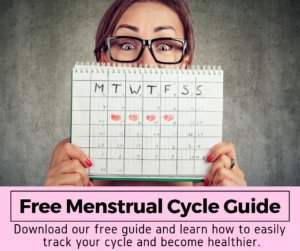- Thyroid imbalance. Every cell in the body depends upon thyroid hormones for regulation of their metabolism, or the conversion of oxygen and calories to energy. Thyroid hormones also influence body temperature, growth and development, and reproduction. An under-active thyroid can cause symptoms such as fatigue, weight gain, cold intolerance, irregular periods, slow digestion, dry pale skin, and thinning hair. An over-active thyroid causes many symptoms too like weight loss, rapid heartbeat, nervousness, anxiety, goiter (enlarged thyroid), thin skin, fine hair, and changes in menstrual patterns.
- Blood sugar abnormalities. Chronic high blood sugar can lead to glucose resistance which can lead to lead to diabetes. Those with chronic low blood sugar (hypoglycemia) are also at risk. In non-diabetics, hypoglycemia usually occurs when you haven’t eaten. Excessive fasting or dieting could put one at risk of becoming malnourished. One of the diagnostic criteria for anorexia nervosa is amenorrhea, or the lack of menses. Nutrition is an important factor in a womans reproductive health.
- Inflammation in the body. Inflammation is good in the short run. It’s part of your immune system’s natural response to heal an injury or fight an infection but is not meant to be long-lasting. Chronic inflammation is seen in many diseases and conditions such as in heart disease, Type 2 diabetes, and Alzheimer’s. The types of food you eat also affect inflammation. A diet full of fruits, vegetables, whole grains, plant-based proteins (like beans and nuts), fish rich in omega-3 fatty acids (such as salmon, tuna, and sardines), and healthier oils, like olive oil can help. However, those with food allergies and sensitivities should be careful to avoid the foods they are sensitive to. The most common allergens are nuts, dairy, gluten, over-processed foods which can be high in unhealthy fats and sugar.
- Cortisol. Cortisol is the hormone that the body releases when it is under stress. It triggers the ‘fight or flight’ response in the body. Because most bodily cells have cortisol receptors, it affects many different functions in the body. Cortisol can help control blood sugar levels, regulate metabolism, help reduce inflammation, and assist with memory formulation. It has a controlling effect on salt and water balance and helps control blood pressure. In women, cortisol also supports the developing fetus during pregnancy. High cortisol levels can contribute to changes in a woman’s libido and menstrual cycle, even without the presence of disease. Anxiety and depression may also be linked to high cortisol levels.
- Prolactin — Prolactin is the hormone that causes women to lactate. In nursing women prolactin is naturally high, thus many lactating women do not have a menstrual cycle. This is normal. However, prolactin can be elevated in non-lactating women and this can cause menstrual cycle irregularities. The common denominator in four of the five have to do with metabolism, or the uptake and usage of the food we eat. Nutrition is an important factor in women’s health. We need to make sure we’re feeding our bodies the right thing, getting adequate rest, and trying to alleviate stress in our life through prayer or meditation or things that we enjoy.






